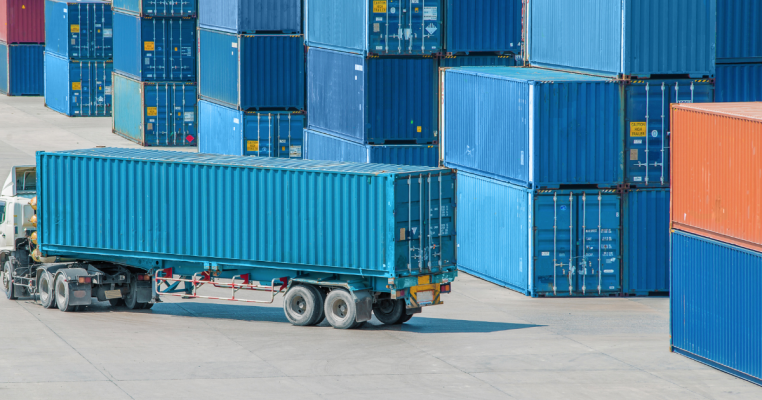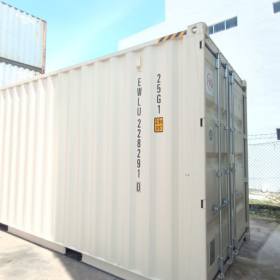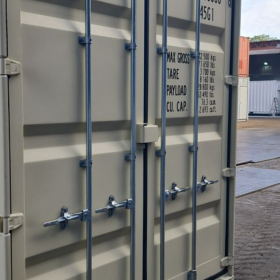In recent years, Thailand has witnessed a significant shift in how shipping containers are utilized beyond their traditional role in logistics and transportation. From urban development projects to innovative business solutions, shipping containers are now at the forefront of modern infrastructure in Thailand. This evolution reflects a broader global trend where containers’ adaptability, durability, and cost-effectiveness are being harnessed in new and creative ways. This blog delves into the growing role of shipping containers in Thailand, highlighting their impact on various sectors and how they contribute to the country’s economic growth and modernization efforts.

The Rise of Container-Based Infrastructure in Thailand
Shipping containers have long been a staple in Thailand’s import-export industry, facilitating the movement of goods across borders efficiently and securely. However, their use has expanded far beyond this traditional role. Today, these containers are being repurposed into versatile structures that support a wide range of industries, from retail and hospitality to construction and urban planning.
1. Container Homes and Offices
One of the most notable trends in Thailand is the growing popularity of container homes and offices. The demand for affordable, flexible housing and workspace solutions has surged as urban areas become increasingly congested. Shipping containers offer a unique solution to this problem, providing a cost-effective, sustainable, and adaptable alternative to conventional construction methods.
These container-based structures are quick to assemble and offer the flexibility to be relocated or modified as needed. This makes them particularly appealing in a dynamic economy like Thailand, where businesses and individuals seek agile solutions to meet changing needs.
2. Retail Spaces and Pop-Up Stores
The retail industry in Thailand has also embraced the use of shipping containers, particularly for pop-up stores and temporary retail spaces. These container-based stores are easy to set up and dismantle, allowing businesses to create temporary retail spaces in high-traffic areas or during seasonal events.
This approach offers several advantages. First, it reduces the overhead costs associated with traditional retail spaces. Second, it allows businesses to quickly adapt to changing market conditions and consumer trends. Finally, the unique aesthetic of container stores often attracts customers, providing a distinct brand identity and an engaging shopping experience.
3. Hospitality and Tourism
Thailand’s booming tourism industry has also seen an increase in container-based accommodations. Eco-friendly resorts and boutique hotels now use repurposed shipping containers to create unique, sustainable, and visually appealing tourist lodging options. These container accommodations offer a modern, industrial-chic aesthetic that appeals to eco-conscious travelers seeking something different from traditional hotels.
Moreover, these container structures are often built sustainably, incorporating energy-efficient designs and materials. This aligns with the global shift towards sustainable tourism, which is becoming increasingly important in Thailand as the country strives to balance economic growth with environmental preservation.
Economic Impact of Shipping Containers in Thailand
Adopting shipping containers in various industries has had a profound economic impact on Thailand. By providing affordable and flexible solutions, these containers are helping businesses reduce costs, increase efficiency, and stimulate innovation. This, in turn, drives economic growth and creates new opportunities across the country.
1. Cost Savings and Efficiency
One of the most significant economic benefits of using shipping containers is their cost savings. Container-based structures are more affordable in terms of materials and labor than traditional construction methods. This makes them an attractive option for businesses and individuals seeking to minimize expenses without compromising quality.
Additionally, the quick assembly and modular nature of shipping containers mean that projects can be completed faster, reducing downtime and allowing businesses to start operations sooner. This efficiency increases productivity and revenue, further contributing to economic growth.
2. Innovation and Entrepreneurship
The versatility of shipping containers has also fostered a culture of innovation and entrepreneurship in Thailand. As more people recognize the potential of these structures, new business ideas and models are emerging. The possibilities are virtually limitless, from container-based co-working spaces to mobile clinics and food trucks.
This trend is particularly evident in Thailand’s start-up scene, where entrepreneurs leverage containers’ flexibility and affordability to launch new ventures. These container-based businesses often serve niche markets or offer unique products and services, helping to diversify the economy and create new jobs.
3. Urban Development and Revitalization
Shipping containers are also crucial to urban development and revitalization efforts across Thailand. In cities like Bangkok, where space is at a premium, containers are used to create innovative solutions for urban challenges. For example, containers are being repurposed into community centers, markets, and educational facilities in underserved areas.
These container-based developments provide essential services to communities and help revitalize neglected or underutilized spaces. By transforming these areas into vibrant, functional spaces, shipping containers contribute to improving urban living conditions in Thailand.
The Future of Shipping Containers in Thailand
As Thailand continues to modernize and urbanize, the role of shipping containers in the country’s infrastructure will likely expand further. Several emerging trends suggest that containers will continue to play a pivotal role in shaping Thailand’s future.
1. Sustainable Development
Sustainability is becoming an increasingly important consideration in Thailand’s development plans. Shipping containers, with their ability to be repurposed and reused, align with this focus on sustainability. We can expect to see more container-based projects that prioritize eco-friendly designs, materials, and practices.
For instance, green roofs, solar panels, and rainwater harvesting systems could become standard features in container homes and offices. Additionally, containers could create vertical farms or urban gardens, contributing to food security and environmental sustainability in urban areas.
2. Smart Cities and Technology Integration
As Thailand becomes a smart nation, integrating technology into container-based structures is likely to become more prevalent. Smart containers with IoT (Internet of Things) devices, sensors, and automation systems could revolutionize how these structures are used and managed.
For example, smart container offices could automatically adjust lighting and temperature based on occupancy, reducing energy consumption and improving comfort. Similarly, container-based logistics hubs could use IoT technology to optimize the movement of goods, enhancing efficiency and reducing costs.
3. Disaster Relief and Emergency Response
Given Thailand’s vulnerability to natural disasters, such as floods and storms, shipping containers could be critical in disaster relief and emergency response efforts. Containers can be quickly deployed as temporary shelters, medical clinics, or command centers in disaster-stricken areas, providing immediate support to affected communities.
Their durability and portability make containers ideal for use in challenging environments where traditional infrastructure may be compromised. As climate change continues to increase the frequency and severity of natural disasters, the importance of container-based solutions in disaster preparedness and response will likely grow.
Conclusion
Shipping containers have come a long way from their origins as simple cargo carriers. In Thailand, these versatile structures are now at the forefront of modern infrastructure, driving innovation, economic growth, and sustainable development across the country. From container homes and offices to retail spaces and disaster relief efforts, the impact of shipping containers is felt in almost every sector of Thai society.
The future looks promising as Thailand continues to embrace the potential of shipping containers. With their ability to adapt to changing needs and environments, shipping containers are poised to play an increasingly important role in shaping the nation’s infrastructure and economy in the years to come.
Explore how OSG Containers Thailand can help you harness the power of shipping containers for your next project. Whether you’re looking to create a unique retail space, develop sustainable housing, or find innovative solutions for your business, OSG Containers offers a range of customizable options to meet your needs. Visit our website to learn more and get started today!





